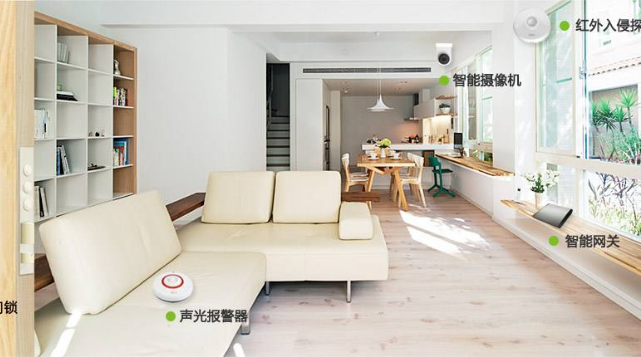2017 has passed. With the arrival of 2018, can artificial intelligence continue to develop? The answer is of course yes. 2018 will be the first year of artificial intelligence. If last year is a foreshadowing, then this year will be a year of advanced development, and smart products will emerge in endlessly, bringing more fun things to everyone.

The trend of smart home has been blowing for many years, but it has never been as fierce as this year. In the blink of an eye, we all seem to have entered the era of smart homes. The most notable sign is that domestic and foreign giants have begun to vie for deployment in the smart home industry. Among them, not only Internet giants represented by BAT and JD.com, but also physical product companies such as Haier and Huawei are actively deploying in this market.
With the rapid development of this industry, the smart home industry has ushered in a new era of competition among hundreds of people, and the scene was once extremely prosperous and chaotic.
The huge incremental market triggers a competitionAs the saying goes, you can't afford to be early without profit. The reason why the smart home industry is so popular is not unrelated to its huge market expectations. Earlier this year, Kearney’s latest report showed that by 2020, the overall scale of global smart homes will grow from the current US$10 billion to US$50 billion, and is expected to surge to US$400 billion in 2030. By 2030, Asian market sales will exceed 115 billion U.S. dollars, occupying more than 25% of the global market. With tens of billions or hundreds of billions of market increments at every turn, it is no wonder that industry giants will scramble to deploy smart homes.
In order to lay out the smart home market, many cross-border giants have carried out in-depth layouts and invested heavily in launching many smart hardware products! In terms of product range, children's watches, smart cameras, night lights, fingerprint locks, air purifiers, smart speakers, etc. are all targets of their research and development, which can be called a wide range of categories. At the same time, companies in the traditional home furnishing industry are also active. Apart from other things, just say that Huida, Dongpeng, and Jiumu, etc., which have strategic cooperation with Yuranzhijia, have established smart home industrial parks and strive to expand their own smart product development process. On the whole, in order to seize the commanding heights of the smart home market, both cross-border giants and original tycoons have launched a life-and-death battle in the increasingly fierce competition.
How can SMEs stand out from the crowd?In the context of many giants forming a self-contained melee, unified industry standards and agreements are difficult to see in the short term. In this embarrassing background, how to achieve their own rapid development is a problem that puzzles many small and medium-sized smart home companies. So, where is the way out for SMEs? Approximately, only product innovation and brand marketing are left.
In today's smart home market, there is still considerable room for innovation in smart home products. Many smart home products look cool, and with carefully prepared promotional materials, it looks really interesting. However, if you analyze it carefully, you will find that those functions are either too low frequency or too high in premium cost, which is the so-called "intelligence and intelligence", which is vividly called "simple hardware module, plus a slight An APP for the mentally handicapped". This is obviously not a smart product that consumers really need. Therefore, small and medium-sized smart home companies can put more effort into the product experience, so that more small and beautiful creative smart home products can be quickly put into the market in order to obtain profit opportunities.
When it comes to brand marketing, in today's flood of information, finding high-end professional communication channels is undoubtedly the best choice for smart home companies. For smart home products that pay special attention to experience, face-to-face communication is of course easier to strengthen brand memory and easier to achieve transactions. Therefore, a smart home professional exhibition with high specifications and large lineup is undoubtedly the best choice for small and medium smart home companies to establish brands and harvest orders.
Tempered Glass Screen Protector
The JJT Tempered Glass Screen Protective Film is protected by specially treated glass, and the Tempered Glass Screen Protector brings excellent scratch resistance to the screen. The Tempered Glass Protective Film is made of shockproof technology, which has the characteristics of anti-scratch, anti-fingerprint and anti-oil, which can greatly reduce the damage to the screen due to strong collision. The adhesive force of the silicon adhesive ensures that there is nothing between the screen protector and the screen, thereby improving touch sensitivity. Ultra-transparent glass can ensure a better clear image quality than ordinary Screen Protectors.
The surface hardness of the Tempered Glass Screen Protection Film is 9H, which is 4 times that of ordinary PET Film. Sharp objects (such as knives and keys) will not scratch the surface.
The Screen Protector has an "oleophobic and waterproof" coating to prevent fingerprints and other contaminants, making the screen protector easy to clean.
It has unparalleled touch and high responsiveness to touch, 99.9% transparency, transparent without bubbles.
Tempered Screen Protector, Tempered Glass Screen Protector, Tempered Glass Protective Film, Tempered Glass Film, Tempered Glass Screen Protective Film
Shenzhen Jianjiantong Technology Co., Ltd. , https://www.mct-sz.com
